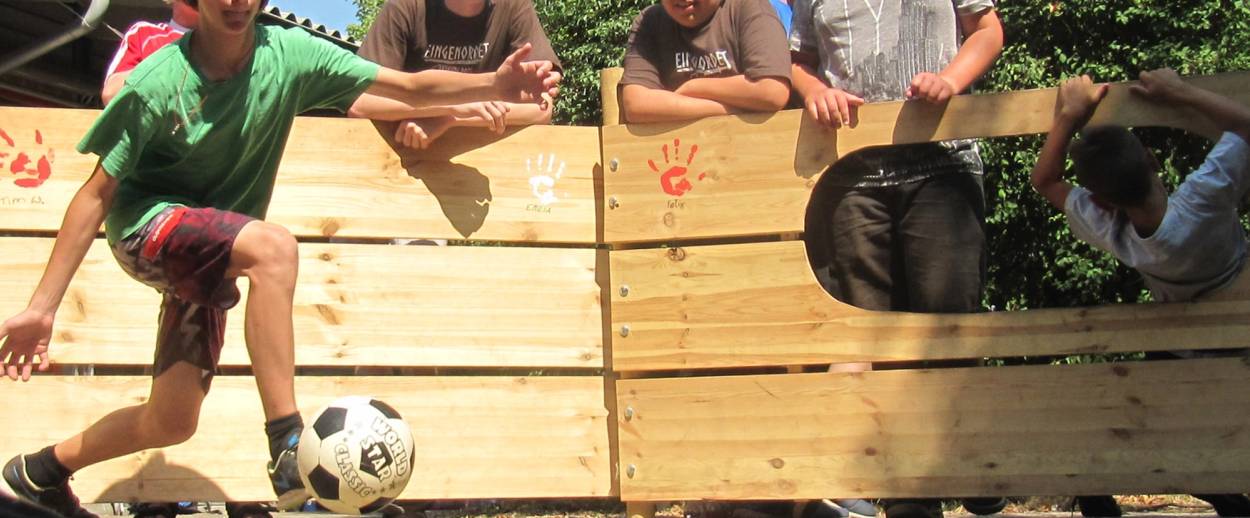Is the Mystery of Ga-Ga, Everyone’s Favorite Summer-Camp Game, Finally Solved?
A quest to find the inventor of the iconic game leads to an unlikely founding father: a nice zayde from Maryland.




This piece was originally published on Aug. 2, 2017.
Last August, I wrote for this website about the popular Jewish summer camp sport of ga-ga, and attempted to get to the bottom of where the game came from. The article debunked theories that it had started in the Israel Defense Forces or had been played at a championship level by actor Sacha Baron Cohen.
I narrowed the game’s creation myth down to a couple of possibilities: that ga-ga either started in Israel at some undetermined time, or at an Adirondacks summer camp in the 1950s, where it was known as Crosleyball.
Now, just in time for another Jewish summer camp season, we have another claim about the origin of ga-ga: A man from Maryland by the name of Steven Steinberg says that he both invented and named ga-ga, himself.
Steinberg was a counselor at Camp Milldale, then a JCC camp in the Baltimore area, as a 17-year-old in the summer of 1975, where his charges were a group of 6-year-old boys. He says he started the game for the same reason it’s still played today at countless summer camps: to keep campers busy on rainy days.
The game, Sternberg says, began when he would take the kids to a covered, wall-less shelter near the woods. They liked to play with a bouncing ball, and in order to keep it from rolling down a nearby hill, Steinberg would place benches on their sides, which kept the ball bouncing back. This led him to develop “a form of dodgeball,” in which the boys would hit the ball and knock out opponents by hitting them below the knee—the idea being that the kids’ shins were about the size of the ball.
As for the name? Steinberg says that during a moment of frustration, he told his campers that they “all look like a bunch of babies”—at which point some of the kids began chanting “goo-goo, ga-ga,” which soon became the name of the game. When Steinberg had to fit the name on a written activity schedule, it was shortened to ga-ga.
That was Steinberg’s last year as a camp counselor, and he never thought about ga-ga again until 1992, when he brought his then 8-year-old son back to orientation at the same camp and it was suggested by a staffer that they go and see “the ga-ga courts.” Later, when his daughter was going to camp in Pennsylvania, he saw a promotional video advertising that ga-ga was played there as well. That’s when he realized the game he came up with in 1975 had caught on and spread.
Steinberg’s story is backed up by an article in the Baltimore Jewish Times in July of 1992, long before the game became the mini-industry that it is today. Steinberg, now a 61-year-old grandfather and a reflexologist in Owings Mills, Maryland, says he has never made any effort to trademark or monetize the game.
How to explain the theories that place the origin of the game prior to 1975? Steinberg says he doesn’t doubt that similar games may have been developed independently of his version, like the Crosleyball that was played as far back as the 1950s—“it doesn’t take a rocket scientist to come up with a game like this,” he says—but he’s adamant that the name ga-ga was definitely his invention.
As for the idea that the sport has Israeli origins, Steinberg said that his camp had Israeli counselors that summer, and he believes they probably spread the game to other camps. But Steinberg especially questions the notion that the name came from “touch touch.”
“It’s simply the imitation of a 6-year-old child!” he said.
Stephen Silver is a journalist in the Philadelphia area whose work has appeared in Philadelphia Magazine, CSNPhilly.com, Splice Today, Screenrant.com, New York Press, and the Good Men Project. Follow him on Twitter @StephenSilver.